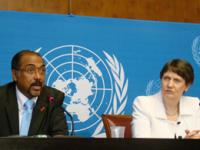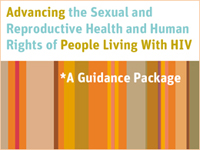Bali, 8 August 2009— Sixty legal experts, people living with HIV, and representatives from key populations in thirteen countries in the Asia and the Pacific region today called on governments to fight HIV discrimination by strengthening and expanding HIV-related legal services. The experts attended a seminar on HIV-related legal services hosted jointly by the International Development Law Organization (IDLO), Asia Pacific Network of People Living with HIV/AIDS (APN+), the Joint United Nations Programme on HIV/AIDS (UNAIDS) and the United National Development Program (UNDP).
The experts also reviewed a Toolkit recently developed by IDLO, UNAIDS and UNDP to improve access to legal services in developing countries and transitional economies, one of the key gaps in the world's response to HIV. The Toolkit will assist governments and NGOs to: 1) develop proposals and submit applications to donors; and 2) initiate, expand and strengthen HIV-related legal services.
The Toolkit guidance covers legal service delivery models applicable in a range of settings for government agencies, stand-alone HIV legal organizations, community service and human rights groups, universities and private sector lawyers. It also includes a model training curricula for lawyers and paralegals, monitoring and evaluation of programs and resource mobilization strategies.
"Experience in the AIDS response has shown that access to legal services is an important part of guaranteeing protection from discrimination, getting redress for human rights violations and expanding access to HIV prevention and treatment," said David Patterson, Manager of IDLO's HIV and Health Law Programme. "However, such programmes are not sufficiently supported by national AIDS responses, and where they do exist, quality and scale are often insufficient."
People living with or affected by HIV often require practical assistance to maintain adequate housing, keep child custody, enforce property and inheritance rights, or access health care, education or employment without discrimination. Access to legal services is even more important in punitive legal environments. An increasing number of countries are passing overly broad laws to criminalize HIV transmission. Men who have sex with men, sex workers and people who use drugs face criminal sanctions in many countries, blocking access to HIV services and heightening HIV vulnerability.
“UNAIDS advocates that access to justice must be a basic, programmatic component of the movement for universal access to HIV prevention, treatment, care and support,” said Susan Timberlake, Senior Human Rights and Law Adviser, UNAIDS. “The persistent reality of discrimination, whether due to HIV status, gender or social status, means that legal services are a critical and necessary part of a comprehensive response to the epidemic.”
No “one size fits all” for legal services
Legal services in the context of HIV take many forms. These include: legal information and advice, including through telephone hotlines; formal litigation, including strategic litigation to create legal policy; mediation and other forms of dispute resolution; assistance with informal or traditional legal systems (e.g. village courts); and community legal education. Legal service providers are not always lawyers. They may be paralegals, volunteers, students or peer educators. Such services are provided in a range of settings, including HIV treatment and counseling centers, mainstream legal aid centers, as well as prisons and community settings. Work may also be linked to advocacy for law reform.
According to Jeff O’Malley, Director, HIV/AIDS Group, UNDP, “the rationale for supporting HIV legal services rests on two related arguments. One, they are essential to improving access to justice and a key means to protect the human rights of socially marginalized and vulnerable populations. Two, they are essential as a means to ensure optimal HIV, health and development outcomes, all of which are underpinned by the realization of rights.”
“One of our goals is to support countries to recognize how important legal services can be to the achievement of universal access and MDG 6, and then work with them to develop a strategy to scale up these services,” explained O’Malley. “Existing HIV-related legal services are generally small in scale and patchy in coverage. With high levels of ‘legal’ marginalization of key populations, the achievement of universal access to prevention, treatment, care and support demands a commitment to strengthening legal protection and access to HIV-related legal services.”
“There are extraordinary examples of great work being done to provide legal services," said Patterson. "It is imperative that legal services are taken to scale with the same urgency that we seek to provide treatment.”
The seminar included participants from Australia, Cambodia, China, India, Indonesia, Malaysia, Nepal, Pakistan, Papua New Guinea, Philippines, Sri Lanka, Thailand, and Vietnam. The seminar took place prior to the International Congress on AIDS in Asia and the Pacific. The Congress is due to be opened on Sunday, 9 August, by the President of the Republic of Indonesia, H.E. Hj. DR. Susilo Bambang Yudhoyono. Financial support for the seminar was provided by AusAID and OFID.
APN+ is the network of people living with HIV and AIDS in the Asia Pacific region. It was established in 1994 at a meeting in Kuala Lumpur by 42 people living with HIV and AIDS (PLHIV) from eight countries in response to the need for a collective voice for PLHIV in the region, to better link regional PLHIV with the Global Network of PLHIV (GNP+) and positive networks throughout the world, and to support regional responses to widespread stigma and discrimination and better access to treatment and care. APN+ is now celebrating its 15 year anniversary with members from 28 countries from across the Asia Pacific Region and maintains a Secretariat Office in Bangkok which coordinates a growing number of regional PLHIV focused projects. www.apnplus.org
AusAID is the Australian Government agency responsible for managing Australia's overseas aid program. The objective of the aid program is to assist developing countries reduce poverty and achieve sustainable development, in line with Australia's national interest. Additional financial support for this seminar was granted through AusAID’s International Seminar Support Scheme (ISSS). The ISSS funds attendance at international development-oriented seminars in Australia and overseas. The scheme helps to develop knowledge and technical expertise in developing countries, and builds linkages between the government, academic and community sectors in Australia and our partner developing countries. www.ausaid.gov.au
IDLO is a non-partisan, intergovernmental organization that promotes legal, regulatory and institutional reform to advance economic and social development in transitional and developing countries. Founded in 1983 and one of the pioneers of rule of law assistance, IDLO uses its access to governments and interest groups of differing ideologies, as well as its expertise and vast stakeholder network, to create opportunity for those most in need. www.idlo.int
OFID is the development finance institution of OPEC Member States, established to provide financial support for socio-economic development, particularly in low income countries. In Asia Pacific, OFID supports IDLO programs on HIV and law in China, Indonesia and Papua New Guinea. www.ofid.org
UNAIDS is an innovative joint venture of the United Nations, bringing together the efforts and resources of the UNAIDS Secretariat and ten UN system organizations in the AIDS response. The Secretariat headquarters is in Geneva, Switzerland—with staff on the ground in more than 80 countries. The Cosponsors include UNHCR, UNICEF, WFP, UNDP, UNFPA, UNODC, ILO, UNESCO, WHO and the World Bank. Contributing to achieving global commitments to universal access to comprehensive interventions for HIV prevention, treatment, care and support is the number one priority for UNAIDS. Visit the UNAIDS website at www.unaids.org
UNDP is the UN’s global development network, advocating for change and connecting countries to knowledge, experience and resources to help people build a better life. We are on the ground in 166 countries, working with them on their own solutions to global and national development challenges. As they develop local capacity, they draw on the people of UNDP and our wide range of partners. www.undp.org




